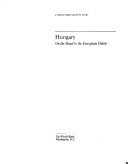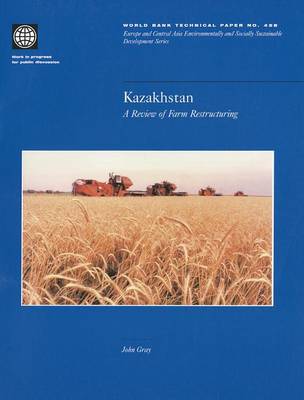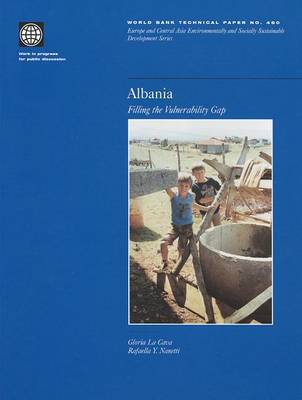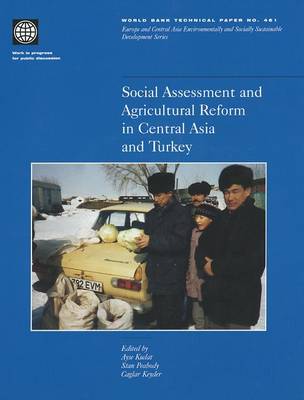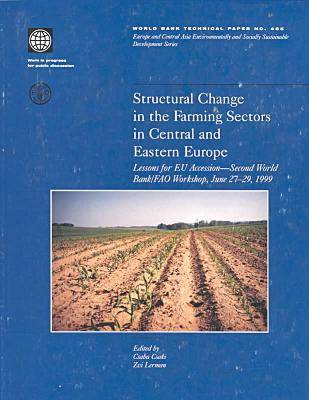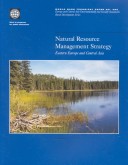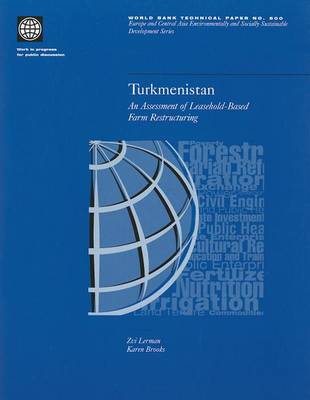World Bank Technical Paper: Europe & Central Asia Environmentally & Socially Sustainable Development
7 primary works
Book 441
With progress in industrial restructuring demonstrated by the evolving composition of exports, Hungary seems well poised to take advantage of becoming part of the European single market. However, threats remain. This study examines present trade policies and makes recommendations for improvement. This publication is a Technical Paper sponsored by the Poverty Reduction and Economic Management Network of the World Bank's Europe and Central Asia Division. It is part of a comprehensive series regarding the many important factors that influence European Union (EU) accession in the Central and East European countries (CEEC). The topics in the series cover both the social and economic aspects of accession across a broad range of sectors. The series also provides background information for specific acceding countries. These publications will be of interest to EU member and candidate countries, their ministries, and any one studying the accession issue.
Book 458
'The success achieved in stimulating real change in farm ownership, control, and management in some areas, combined with the extremity of the difficulties faced by farms in less-favored areas, point to the need for an active process of policy reformulation to address the problems which are now emerging from the restrcturing process.' Agriculture in Kazakhstan is in crisis--the majority of farms are insolvent and production has fallen to the lowest level in 30 years. Initial restructuring efforts yielded disappointing results and mostly failed to lead to new patterns of ownership or management. However, since 1998 the government has pursued a more aggressive approach to farm restructuring based on increased reliance on farm bankruptcy. This report reviews the experience of the farm restructuring policies and programs pursued in 1998 and 1999 and draws conclusions for the continuing development of agricultural sector policies. This review forms one of a group of simultaneous agricultural sector studies undertaken by the World Bank at the request of the Government of Kazakhstan. Kazakhstan: A Review of Farm Restructuring reviews the progress to date in the implementation of the government's reform measures which were begun in late 1998. The report is based on a field mission undertaken in April-May 1999, which concentrated primarily on the Northern oblasts and information provided by the staff of the Headquarters of the Ministry of Agriculture in Astana.
Book 460
During Albania's transition from a centralized economy to one anchored in a body of Western laws, deep social unrest, widespread poverty, uncontrolled migration, and the reemergence of clan-based loyalties have led to an increase in the most vulnerable population groups. These groups are more likely to be marginalized by the economic cycle, thus making it more difficult to ensure asuccessful transition. One purpose of the study is to identify key emerging social issues and problems in Albania and determine their causes. However, the main purpose of this report is to propose a short- to medium-term action strategy to guide and connect social policy and assistance initiatives targeted to the vulnerable groups in areas where they are most numerous, through a bottom-up approach.
Book 461
Social Assessment and Agricultural Reform in Central Asia and Turkey
by World Bank
Published 3 April 2000
'Rural families in the CIS enjoyed more equal conditions under socialist regimes. The withdrawal of the state from many areas of life is increasing inequality between rural and urban people. Subnational inequalities within the rural sector are also growing.' The transformation of Central and Eastern European agriculture started almost a decade ago. Looking back, it can be seen that the countries concerned made the right choice in setting their overall goals and policies for transition to a market economy, but the social costs have been high. Under the present economic and political conditions in the region, there is no alternative to the creation of a market economy based on private ownership. However, given the developments of the past eight years, it is clear that the initial expectations for transformation were overly optimistic and the transition process is far more complicated and complex than anyone imagined in 1991. The region's agrarian economy is still struggling to adjust to economic reality. This volume presents a fascinating overview of social assessments carried out in Central Asia and Turkey as they relate to the preparation of World Bank agricultural projects designed to support the transition of agriculture from a socialist, or semi-feudal, system to a modern market-conforming system. Taking a retrospective look at the agricultural transition in the region, one could come to the conclusion that the social aspects of the transition have been given short shrift. Increased social tensions created by the delayed reforms have brought these problems to the forefront of agricultural policy decisionmaking and have put pressure on the governments to solve them. This compendium not only provides a comprehensive review of the social problems emerging out of the transition in the regional rural sector, but it also identifies some of their root causes.
Book 465
Structural Change in the Farming Sectors in Central and Eastern Europe
by World Bank
Published 4 May 2000
Farm structures in Central and Eastern Europe (CEE) today cover a whole spectrum of forms, which include small subsistence-oriented household plots, medium-sized commercial family farms, and large corporations. The agricultural sector in CEE definitely has not embraced the family farm as the dominant farming structure, thus confounding the original expectations of Western experts. On the other hand, agriculture did not collapse because of fragmentation and privatization, as predicted by conservative doomsayers. To address the concerns of the farming sector in CEE with relation to EU accession, a workshop was held in Warsaw, Poland in June 1999. This volume represents a selection of papers presented at this workshop. It examines the reforms and policy changes necessary in the food and agriculture sectors of the ten countries that have started the accession process for eventual membership in the European Union (Bulgaria, Czech Republic, Estonia, Hungary, Latvia, Lithuania, Poland, Romania, Slovakia, and Slovenia). The papers are organized around the following three topics: - Evolving farm structures and competitiveness in agriculture; - Land laws and legal institutions for development of land markets and farm restructuring; and - Development of farm services for improved competitiveness. This volume will be of interest to agricultural policy makers and government officials in the candidate countries, EU officials, World Bank and FAO staff, development scholars, and all others interested in the process of agricultural reform in CEE.
Book 485
Arable land, deserts, mountains, forests, rivers, and coastal zones characterize the diverse regions in Eastern Europe and Central Asia (ECA). As varied as the geography is so are the policy directions taken by the region's governments concerning natural resource management. A lack of conservation measures, misuse, and poor management have impaired many of the natural resources now available in these countries. Although the pressure on natural resources in ECA is less than in other regions and the area has more abundant resources, the accessibility and utility of those resources belie the figures. Where there is arable land, the growing season is short. Where there are immense forests, the climate is harsh.To assist the Bank's client countries in ECA with sustainable use of natural resources, this volume identifies the various challenges, provides a history of the Bank's regional natural resource strategy, outlines a strategic framework, and proposes new strategies and policy instruments to implement them. Natural resources in this publication refer to 'non-mineral' resources, such as, forests, rivers, and land.
Book 500
This study on Turkmenistan is the latest addition to a long and growing series of World Bank publications on land reform and farm restructuring in the former socialist countries of Europe and Central Asia. The present report combines an analysis of the 1998 farm survey overview of general agricultural policies and sectoral performance. Survey results are preceded by a sectoral review and a description of emerging legal framework for land reform and farm restructuring.
